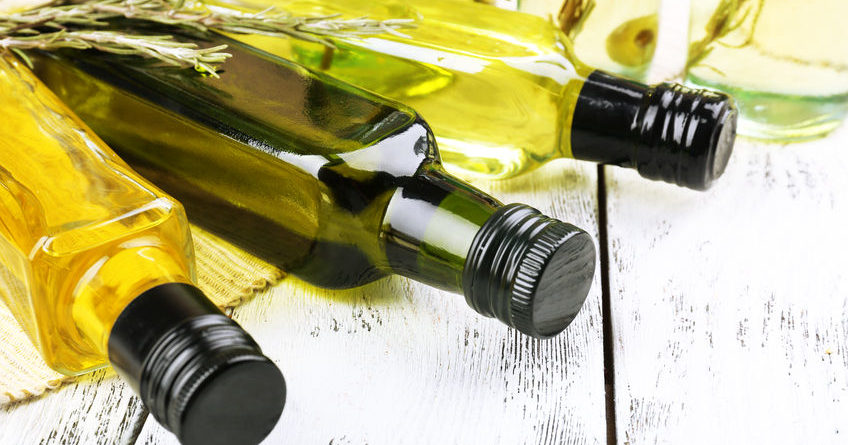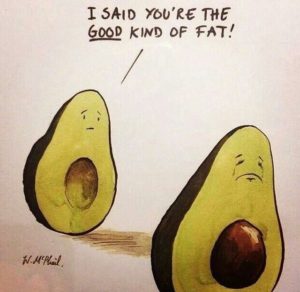In 2017, it’s safe to say that most people have been enlightened regarding the myth that all dietary fat is bad and should be avoided. Still, in this era where information is just a click away, it’s easy to be overwhelmed by all the {sometimes} conflicting facts and opinions out there. So here’s the skinny, according to Dr. Brown, on which fats and oils are beneficial and should be incorporated into your diet and which ones are harmful and should be avoided.
Fats are an essential part of a healthy diet. And when I say essential, I mean that in the literal form of the word, as in can’t live without them. Specifically, there are two fatty acids (alpha-linolenic acid, an omega 3 fat, and linoleic acid, an omega 6 fat) that must be obtained in the diet as they are not made within the body but are necessary for certain physiological processes like brain development and blood clotting (just to name a few). Without getting too detailed in the chemistry of fats, when people are talking about “good fats,” most are referring to fats that contain omega 3’s, omega 6’s, and omega 9’s, but just because a food is high in one or more of these fatty acids doesn’t mean you should eat as much as you want of them. There is an ideal ratio, and the general rule to live by is to try and eat more omega 3’s than omega 6’s and more omega 6’s than omega 9’s. Also, avoid ALL trans- fats (aka partially hydrogenated oils).
Remember though, as with most paleo-inspired diets, the Dr. Brown Diet encourages you to simply focus on eating foods in their natural state and avoiding foods that are processed. This guideline can also be used to easily categorize which fats are “good” and which are “bad” rather than getting too caught up on the chemical makeup of one fat verse another, and as with any food, moderation really is key. So with all that said, here are Dr. Brown’s suggestions regarding food sources of fat:
- Meats: Organic, grass-fed meats (like beef and lamb) are high in Omega 3’s and should be eaten regularly as part of a healthy diet.
- Fish: Wild caught, cold-water fish (like salmon) are also high in Omega 3’s and should be an integral part of your regular diet.
- Oils: Unrefined, cold-pressed oils are best. Heated oils become rancid so should be avoided.
- Eat: flax oil (the only oil high in Omega 3s)
- In Moderation: olive oil, sesame oil, avocado oil, safflower oil, sunflower oil (all either high in omega 6s or 9s) and coconut oil (which contains no essential fatty acids but obtains other health benefits)
- Avoid: Soybean (vegetable) oil, corn oil, cottonseed oil, peanut oil, canola oil.
- Nuts and seeds: Because intestinal irritation can occur, Dr. Brown suggests avoiding whole nuts or seeds and instead opting for nut/seed butters or flours.
- Eat in moderation (generally high in Omega 6s): almonds, pecans, walnuts, cashews, hazelnuts, pistachios, brazil nuts, pine nuts, macadamia nuts, chestnuts, pumpkin seeds, sesame (tahini), flax
- Avoid: Chia and peanuts (Peanuts are actually a legume, meaning they grow in the ground rather than on a tree like the true “nuts” mentioned above. Dr. Brown would have you avoid them because they are known to grow in moist places and may be contaminated with mold.)
- Fruits: Avocados, olives, and coconut all contain many health benefits and can be enjoyed (in moderation) in a healthy diet.
- Saturated Fats:
- Eat: pasture butter, ghee, beef tallow
- Avoid: margarine, shortening, vegetable spreads
Hopefully this quick guide to fats will help you continue to progress on your quest to adopting a healthy lifestyle and making better dietary choices. Feel free to post any questions you might have, and I’ll do my best to answer them or get you the answer from the doc himself.
In health,







thanks Kristen! Super helpful!
You’re welcome! =)
[…] Healthy Fats & Oils: Contrary to popular belief, many components of fat including even cholesterol and saturated fatty acids, when obtained from healthy sources such as flax oil or pasture butter, actually play a critical role in digestion. For example, cholesterol is the precursor to bile which is necessary for the break down of fats, and saturated fats are involved in the process that results in muscle contraction within the gastrointestinal tract, a necessary function for proper digestion.7 For greater detail on this subject, read my blog post titled “Fats and Oils: What’s the Skinny?” […]
Very informative, however I have read other sources that indicate that nuts and seeds are healthy snacks and very essential. Furthermore they are my go to snacks instead of potato chips. However I will take your suggestion to eat specific ones in moderation. When is the best time to them in moderation?
Hi Pamela! Thanks for the comment. Nuts and seeds do contain good fats, so yes in that way they are healthy for you. However because of their hard texture, they can also irritate the intestinal tract during digestion. Nut butters don’t cause this problem though making them the more ideal option. One of my favorite snacks is apple slices with cashew butter! And I’ve seen Dr. Brown put almond butter on his broccoli — he swears its delicious! I haven’t had a chance to try that one yet but its definitely an interesting option. I’m not sure that there is an optimal “time” per say to eat them, but as with most things moderation is definitely key. Hope this helps!
[…] food, high in the essential Omega 6 fatty acids. Remember as mentioned in a previous post, “Fats and Oils: What’s the Skinny,” however, that there is an ideal ratio of Omega 3, Omega 6 and Omega 9 fats. The general […]